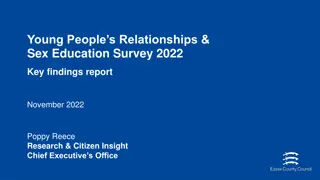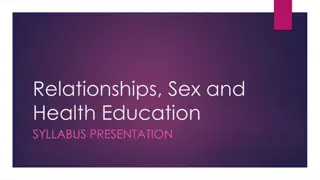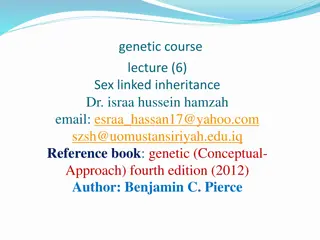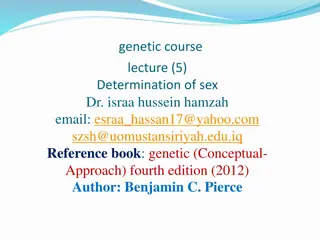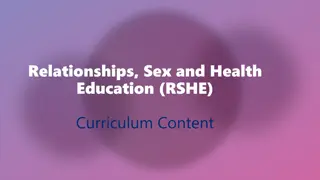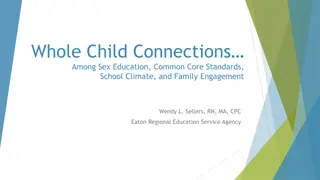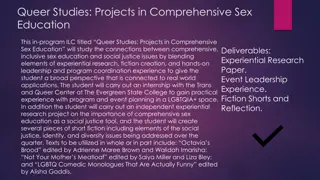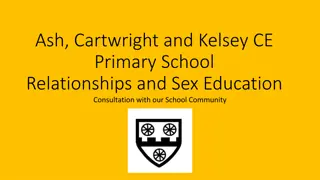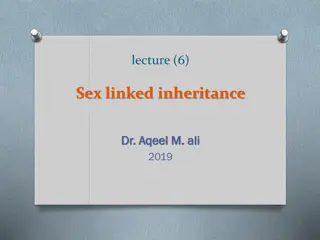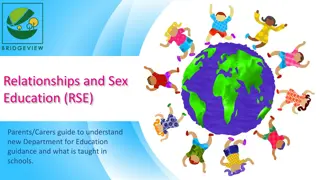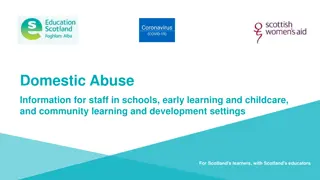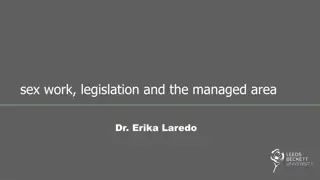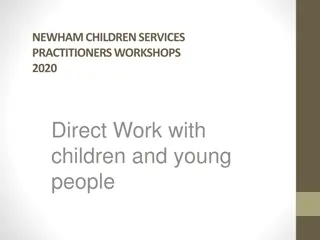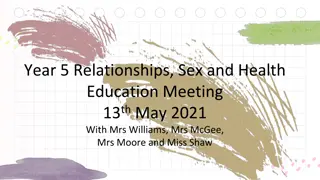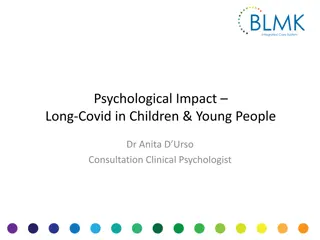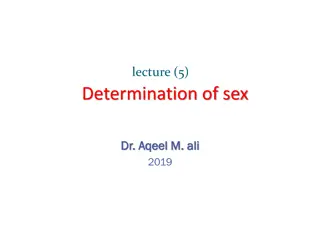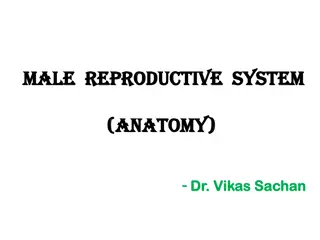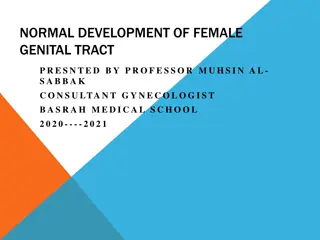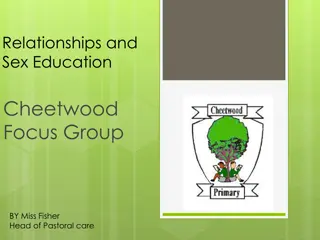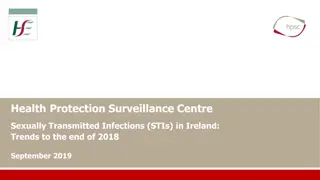Importance of Relationships and Sex Education for Children and Young People
Today's children and young people face challenges in a complex world, making it crucial to provide high-quality Relationships and Sex Education (RSE) in schools. RSE helps create safe school environments, fulfilling statutory duties to protect students and promoting positive behavior. This education equips children with essential knowledge and skills to navigate their personal, social, and academic lives safely and healthily. Collaboration between parents, caregivers, and schools is vital in delivering effective RSE programs that support the well-being and development of children.
Download Presentation

Please find below an Image/Link to download the presentation.
The content on the website is provided AS IS for your information and personal use only. It may not be sold, licensed, or shared on other websites without obtaining consent from the author. Download presentation by click this link. If you encounter any issues during the download, it is possible that the publisher has removed the file from their server.
E N D
Presentation Transcript
Parent Consultation on Parent Consultation on Relationships and Sex Education Relationships and Sex Education HILL TOP SCHOOL HILL TOP SCHOOL June 2021 June 2021
Common Principles We all want what is best for children. We want to protect children and to keep them safe. We want children to be healthy and happy. High quality RSE is part of this.
How is this achieved? Partnership How is this achieved? Partnership Parents/carers Child school school We need to working together? We need to share viewpoints and listen.
Parent Consultation Overview of Content: Why the Curriculum is Changing? - Why is RSE in Schools Important - Statutory Guidelines - Relationships Education in Primary - Physical health and Mental Wellbeing in Primary - Overview of Teaching Expectations: Primary - Relationships and Sex Education in Secondary - Physical Health and Mental Well Being in Secondary -Overview of Teaching Expectations : Secondary - Relationships and Sex Education Supporting Journey to Independence - Focus on different Curriculum Milestones - Whole School Approach - RSE Policy - Support for Parents and Carers : RSE Guides - Commonly asked questions / Addressing some misconceptions - What happens next?
Why the Curriculum Why the Curriculum is Changing . is Changing . Today s children and young people are growing up in an increasingly complex world and living their lives seamlessly on and offline. This presents many positive and exciting opportunities, but also challenges and risks. In this environment, children and young people need to know how to be safe and healthy, and how to manage their academic, personal and social lives in a positive way. The Children and Social Work Act 2017 introduced a new legislation on Relationships Education, Relationships and Sex Education, and Health Education in Schools. Safeguarding Children is at the heart of Relationships and Sex Education.
Why is Relationships and Sex (RSE) Education Why is Relationships and Sex (RSE) Education in Schools Important? in Schools Important? High quality RSE helps create safe school communities in which students can grow, learn, and develop positive, healthy behaviour for life, and for the following reasons: RSE plays a vital part in schools fulfilling their statutory duties to protect and safeguard their students. Ofsted is clear that schools must have a preventative programme that enables students to learn about safety and risks in relationships. Schools maintain a statutory obligation under the Children Act (2004) to promote their students wellbeing and under the Education Act (2002) to prepare children and young people for the challenges, opportunities and responsibilities of adult life. A comprehensive RSE programme can have a positive impact on students health and wellbeing and their ability to achieve, and can play a crucial part in meeting these obligations. Technology is evolving at a tremendous pace. The need to protect children and young people from inappropriate online content, cyber-bullying and exploitation is a growing concern. A comprehensive RSE programme can support in addressing these issues.
Relationships and Sex Education: Introduction Relationships and Sex Education: Introduction Relationships education will be compulsory for all primary age pupils from September 2020. Relationships and Sex education (RSE) will be compulsory for all Secondary age pupils Health education will be compulsory for all pupils in all state funded schools. Teaching at school will complement (NOT REPLACE) and reinforce the lessons families teach their children as they grow up. At Hill Top, we aim to flexibly and inclusively deliver any content in a way that is age and developmentally appropriate with respect to the backgrounds and beliefs of pupils and parents while always with the aim of providing pupils with the knowledge they need of the law.
Relationships Education in Primary Schools. Relationships Education in Primary Schools. Relationships Education is introduced at Primary and students explore the following areas: Families and people who care for me Caring Friendships Respectful Relationships Online Relationships Being Safe Sex education is not compulsory in primary schools
Physical Health and Mental Well Being in Physical Health and Mental Well Being in Primary Schools. Primary Schools. The aim of teaching pupils about physical health and mental wellbeing is to give them information they need to make good decisions about their own health and wellbeing with a clear focus on reducing stigma attached to health issues. In primary school the focus should be on teaching the characteristics of good physical health and mental wellbeing and the benefits of hobbies, interests and participation in their own communities. By embedding these principles teachers should be able to address issues such as isolation, loneliness, unhappiness, bullying and the negative impacts of poor health and wellbeing. Physical Health and Mental Well Being Teaching in Primary include learning units around Mental Wellbeing, Internet Safety and Harms, Physical Health and Fitness, Drugs/Alcohol/Tobacco/Basic First Aid/Changing Adolescent Body)
Overview of Teaching Expectations: Primary Overview of Teaching Expectations: Primary Relationships Education (Primary) Physical Health and Mental Well Being (Primary) Families and People who care for me Mental Wellbeing Caring Friendships Internet Safety and Harms Respectful Relationships Physical Health and Fitness Online Relationships Healthy Eating Being Safe Drugs, alcohol and tobacco Health and Prevention Basic First Aid
Relationships and Sex Education (RSE) in Relationships and Sex Education (RSE) in Secondary schools. Secondary schools. The aim of Relationships and Sex Education is to give young people the information needed to develop healthy , nurturing relationships of all kinds ,not just intimate relationships. Effective Relationships and Sex Education does not encourage early sexual experimentation but teaches young people to understand human sexuality and respect themselves and others . Knowledge about safer sex and sexual health remains important to ensure young people can make safe, informed and healthy choices as they progress to adultlife . Pupils should also be given opportunities to understand how healthy relationships can benefit their own mental wellbeing and self respect. RSE in Secondary schools includes learning around families ,respectful relationships including friendships ,online and media ,being safe ,Intimate and Sexual Relationships including sexual health.
Relationships and Sex Education (RSE) in Relationships and Sex Education (RSE) in Secondary schools. Secondary schools. There should be opportunities for pupils to learn about the laws surrounding sex, sexuality, sexual health and gender identity which should be delivered in an age and developmentally appropriate and inclusive way. The laws around a variety of other issues should be considered which include: marriage, consent, pornography, radicalisation and gangs. There should also be opportunities to learn about grooming, sexual exploitation and domestic abuse which should include addressing coercive and controlling behaviour. The physical and emotional damage that can be caused by female genital mutilation (FGM) should also be addressed.
Physical health and mental wellbeing in Physical health and mental wellbeing in Secondary Schools. Secondary Schools. Pupils should be taught to make well informed, positive choices for themselves that seek to support their own health and wellbeing. There should be opportunities for teaching pupils about problems and challenges, including more serious mental and physical health conditions such as substance and alcohol misuse, with a focus on providing information about effective interventions. Schools may also choose to teach about issues such as eating disorders. Teachers should also demonstrate awareness of common adverse childhood experiences such as bereavement, family breakdown and exposure to domestic abuse, and how these might impact on pupils and influence how they experience these subjects. Pupils should be taught how to judge when they or someone they know needs support and where they can seek help if needed.
Overview of Teaching Expectations: Secondary Overview of Teaching Expectations: Secondary Relationships and Sex Education (Secondary) Physical Health and Mental Well Being (Secondary) Families Mental Wellbeing Respectful Relationships including Friendships Internet Safety and Harms Online and Media Physical Health and Fitness Being Safe Healthy Eating Intimate and Sexual Relationships including Sexual Health Drugs, alcohol and tobacco Health and Prevention Basic First Aid Changing Adolescent Body
RSE Curriculum: Supporting Journey to RSE Curriculum: Supporting Journey to Independence. Independence. At Hill Top School Relationships and Sex Education will be delivered through the PSHE curriulcum which is part of the Wellbeing Curriculum The Relationships and Sex Education and Health Education Statutory Guidance (2019) ( alongside Preparation for Adulthood Outcomes PfA) All Schools must have regard to the Statutory Guidance and where they depart from those parts which state what schools should or should not teach, they will need to have good reasons for doing so. At Hill Top School, RSE curriculum content and outcomes are embedded in the following identified curriculum strands: - Wellbeing, - Understanding Our World - Independent Living RSE Curriculum Content is spread across a sequence of milestones and is taught by the school teachers and where appropriate outside visitors and professionals. SEND needs are always taken into consideration when covering content.
RSE Curriculum: Focus of different milestones. The focus at Hill Top School is to build on or revisit the foundations already covered in primary school this includes healthy, respectful relationships, focusing on family and friendships in all contexts including online. This sits alongside the essential understanding of how to be healthy. This will create opportunities to ensure children are taught about positive emotional and mental wellbeing and how friendships can impact on this. Children where appropriate will be taught to recognise and report any types of abuse including emotional, physical or sexual. This will include focusing on boundaries (including online) and privacy so that children understand that they have rights over their bodies and know how to seek advice when they suspect something is wrong. At later stages and where appropriate children will also be introduced to knowledge about Intimate Relationships and Sex Education. Teaching about mental well being is central to the RSE offer. Financial Education/Economic Wellbeing and Careers content is also included in the wellbeing and Independent Living Strand of the curriculum
Whole School Approach Whole School Approach All of these subjects should be and are set in the context of a wider whole- school approach o supporting pupils to be safe, happy and prepared for life beyond school. For example, the curriculum on relationships and sex should complement, and be supported by, the school s wider policies on behaviour, inclusion, respect for equality and diversity, bullying and safeguarding. At the heart of Relationships Education, Relationships and Sex Education and Health Education, there is a focus on keeping children safe and the role that schools can play in preventative education. Clear reference of this link is included in our Draft RSE Policy.
RSE Policy RSE Policy A draft RSE Policy has been drawn to reflect current statutory guidance including RSE curriculum offer. Our Draft RSE policy in line with RSE Guidance 2020 includes information on what is Relationships and Sex Education, Aims and Objectives, Links with other policies, RSE Curriculum content and planning, answering difficult questions, areas of responsibility, sensitive issues, CP and Confidentiality, parental right to withdraw, working with external agencies, etc.
Support for parents and carers. Support for parents and carers. DfE has produced guides for parents of primary and secondary aged children which can be used by schools to communicate how relationships and health education will be taught. The guides provide details of topics that will be covered and information of parent s rights to withdraw. (DfE, 2019c). You may access relevant guides following the link below https://www.gov.uk/government/publications/relationships-sex-and- health-education-guides-for-schools These are also accessible on the school website.
COMMONLY ASKED QUESTIONS ADDRESSING COMMONLY ASKED QUESTIONS ADDRESSING MISCONCEPTIONS. MISCONCEPTIONS.
Will my childs school have to engage with me Will my child s school have to engage with me before teaching these subjects? before teaching these subjects? Schools will be required to consult with parents when developing and reviewing their policies for Relationships Education and RSE, which will inform schools decisions on when and how certain content is covered. Effective consultation gives the space and time for parents to input, ask questions, share concerns and for the school to decide the way forward. Schools will listen to parent s views, and then make a reasonable decision as to how they wish to proceed. What is taught, and how, is ultimately a decision for the school and consultation does not provide a parental veto on curriculum content. (UK Gov)
Do I have a right to withdraw my child from Do I have a right to withdraw my child from Relationships and Sex Education? Relationships and Sex Education? From September 2020 in Primary Education parents will be able to withdraw their children from any aspects of Sex Education other than those which are part of the Science Curriculum (Note that Sex Education is not compulsory in Primary Schools). Parents will continue to have a right to request to withdraw their child from sex education delivered as part of RSE in secondary schools (other than those which are part of the Science Curriculum), which, unless there are exceptional circumstances, should be granted up to three terms before their child turns 16. At this point, if the child themselves wishes to receive sex education rather than be withdrawn, the school should make arrangements for this to happen in one of the three terms before the child turns 16-the legal age of sexual consent. There is no right to withdraw from Relationships Education or Health Education at Primary or Secondary as we believe that the contents of these subjects-such as family, friendships, safety (including online safety) are important for all children to be taught.
Does the new Relationships Education and RSE Does the new Relationships Education and RSE curriculum take account of my faith? curriculum take account of my faith? The DfE states that Relationships Education has been designed to help children from all backgrounds build positive and safe relationships, and to thrive in modern Britain this means taking into account the religious background of pupils when planning teaching, so that topics are appropriately handled. In developing these subjects, the government has worked with a number of representative bodies and faith organisations, representing all the major faith groups in England. Several faith organisations produce teaching materials that schools can choose to use. The subjects are designed to help children from all backgrounds build positive and safe relationships, and to thrive in modern Britain.
Has the government listened to the views of Has the government listened to the views of my community in introducing these subjects? my community in introducing these subjects? A thorough engagement process, involving a public call for evidence and discussions with over 90 organisations, as well as the public consultation on the draft regulations and guidance, has informed the key decisions on these subjects. The consultation received over 11,000 responses from teachers, schools, expert organisations, young people and parents these responses have helped finalise the statutory guidance.
Will my child be taught about Will my child be taught about Lesbian,Gay and Transgender(LGBT) relationships? and Transgender(LGBT) relationships? Lesbian,Gay, Bisexual , Bisexual We believe that all pupils should be taught about the society in which they are growing up. Relationships Education is designed to foster respect for others and for difference and educate pupils about healthy relationships. We also believe that children should receive teaching on LGBT content during their school years. Teaching children about the society that we live in and the different types of loving, healthy relationships that exist is very important. *The DfE states that Primary schools are strongly encouraged and enabled to cover LGBT content when teaching about different types of families. Secondary Schools should cover LGBT content in their RSE teaching. RSE should meet the needs of all pupils, whatever their developing sexuality or identity-this should include age appropriate and developmentally appropriate teaching about different types of relationships in the context of the law.
What support will schools receive to deliver these What support will schools receive to deliver these subjects well? subjects well? The government has invested in a central support package to help teachers introduce these subjects well and with confidence. This will include a new online service, featuring access to high quality resources, innovative training materials, case studies and an implementation guide, available from Spring 2020. There will be training available for teachers through existing regional networks, offering opportunities to improve subject knowledge and build confidence. Collaboration with expert organisations (PSHE association), schools and teachers to develop this support.
What happens next? What happens next? Draft RSE policy uploaded onto website for consultation website 10 days Parent Consultation Session Content (this power point) website Parents Questionnaire/Survey Monkey - Please complete relevant Parent Consultation Questionnaire, to we can gather your views to Inform draft policy RSE (review after consultation). Include topic overview on a termly basis for all areas of school including autism centre. Teaching staff are in the process of designing creative lesson plans as part of which we are carefully considering resources that will safely and subtly address all topics and areas.
Thank you! We hope, as parents/carers you have the confidence that we are providing the highest quality education for your children. As a school community we are committed to working in partnership with parents so your views will be greatly appreciated to further inform our RSE policy and curriculum. Please complete Parental Survey Thank you!


